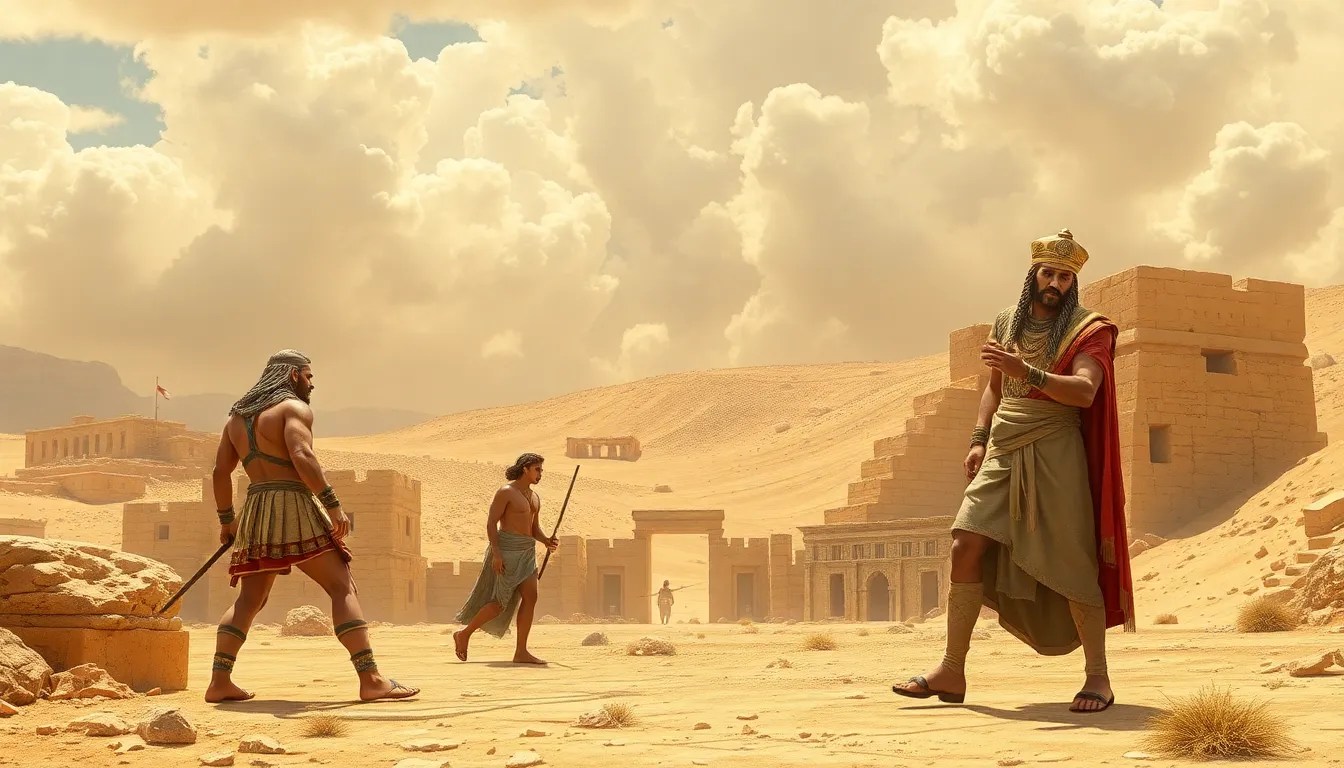The Character of Atrahasis: A Study in Heroism
I. Introduction to Atrahasis
Atrahasis is a significant figure in Mesopotamian mythology, representing the archetype of the hero who confronts divine challenges and seeks to protect humanity. His story, encapsulated in the ancient text known as the Epic of Atrahasis, provides insights into the complexities of heroism within the cultural and religious contexts of the time.
The importance of Atrahasis extends beyond his narrative; he embodies the values and struggles faced by ancient Mesopotamians. This study aims to explore the concept of heroism as illustrated through the character of Atrahasis, analyzing his journey, trials, and relationships with both deities and humanity.
II. Historical and Cultural Context
The origins of Atrahasis can be traced back to the early Babylonian civilization, where the epic was likely composed during the Old Babylonian period (circa 2000-1600 BCE). The Epic of Atrahasis is one of the earliest examples of literature that addresses the themes of creation, destruction, and the struggle for survival.
The significance of this epic lies in its reflection of the Mesopotamian worldview, where the gods created humanity to relieve their own burdens. When humans became too noisy and numerous, the gods decided to send a flood to reduce their population, and Atrahasis emerged as the hero who defied this divine decree.
When comparing Atrahasis to other Mesopotamian myths, such as the Epic of Gilgamesh and the Enuma Elish, we find similar themes of divine interaction, human fragility, and the pursuit of knowledge. However, Atrahasis stands out due to his proactive role in seeking solutions to existential threats.
III. The Hero’s Journey: Atrahasis’ Narrative Arc
Atrahasis’s narrative arc follows the classic hero’s journey, beginning with his early life and divine parentage. Born to the god Enki, who represents wisdom and water, Atrahasis is destined for greatness.
The call to adventure arises when the gods decide to unleash a catastrophic flood upon humanity. Atrahasis, warned by Enki, embarks on a quest to save his fellow people. His trials and tribulations include constructing a large boat and gathering pairs of every animal species to ensure the continuation of life after the flood.
IV. The Themes of Wisdom and Knowledge
Atrahasis exemplifies wisdom in the face of adversity, utilizing the divine knowledge bestowed upon him by Enki. This wisdom is crucial as he navigates the challenges posed by the gods, demonstrating that heroism often involves intellect as much as physical strength.
His solutions to the challenges he faces—building an ark and preserving life—showcase the importance of foresight and strategic thinking. These elements of wisdom highlight Atrahasis’s role as a hero who not only acts but also thinks critically about the consequences of divine wrath.
V. Atrahasis and the Concept of Sacrifice
The theme of sacrifice is prevalent in Atrahasis’s story. He sacrifices his comfort and security for the sake of humanity, taking on the burden of building the ark and ensuring the survival of life on Earth.
In ancient cultures, the relationship between sacrifice and heroism is profound. Heroes are often portrayed as individuals who give up their desires for the greater good, exemplifying selflessness. Atrahasis’s narrative invites reflection on the nature of personal and communal sacrifice, emphasizing that heroism is often rooted in the willingness to endure hardship for others.
VI. The Relationships with Deities and Humanity
Atrahasis’s interactions with deities showcase both allies and adversaries. While Enki serves as a protector and guide, other gods, like Enlil, pose threats to humanity’s existence, highlighting the duality of the divine sphere where gods can be both nurturing and destructive.
This duality complicates Atrahasis’s heroic status; he is portrayed as the savior of humanity while also being a pawn in the gods’ larger schemes. His relationships with the deities reflect the complexities of heroism in Mesopotamian mythology, where heroes often navigate a precarious balance between divine will and human agency.
VII. Legacy and Influence of Atrahasis in Later Mythologies
The legacy of Atrahasis extends beyond Mesopotamian mythology, influencing later narratives, including the biblical story of Noah. Many elements of Atrahasis’s flood narrative reappear in the tale of Noah’s Ark, suggesting that Atrahasis serves as a precursor to these global myths.
Moreover, Atrahasis’s story resonates with modern interpretations of heroism, where the lessons of wisdom, sacrifice, and the struggle against overwhelming odds continue to inspire contemporary audiences. The enduring nature of his heroism serves as a reminder of humanity’s resilience and ability to confront calamity.
VIII. Conclusion
In summary, Atrahasis emerges as a complex hero whose narrative offers profound insights into the nature of heroism in ancient Mesopotamian culture. His journey, characterized by wisdom, sacrifice, and his relationships with both deities and humanity, illustrates the multifaceted aspects of what it means to be a hero.
As we reflect on the relevance of Atrahasis in contemporary discussions of heroism, it is evident that his story is not merely an ancient myth but a timeless exploration of the human experience. Further exploration of Mesopotamian mythology can deepen our understanding of these archetypal narratives and their significance in shaping cultural values and beliefs.



